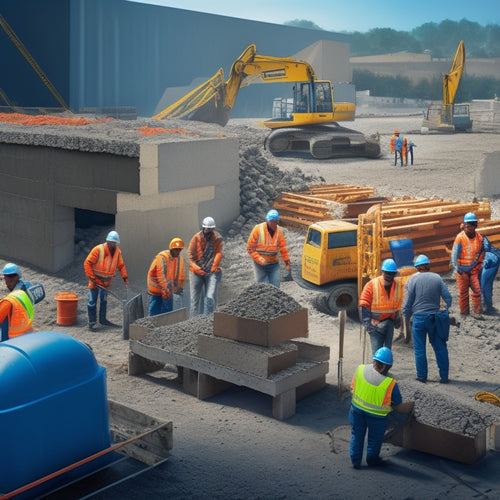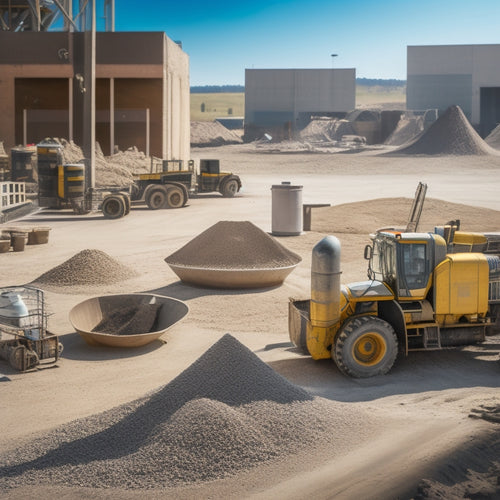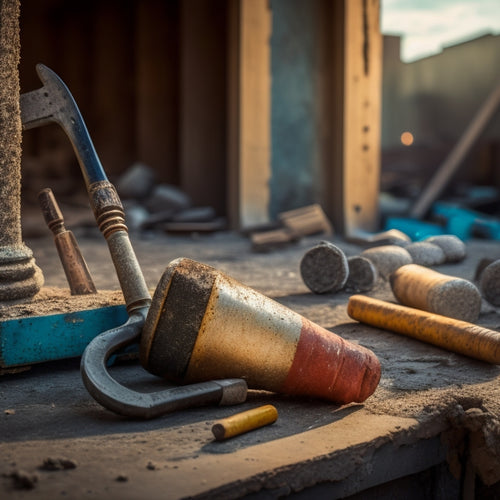
Top 5 Tools for Concrete House Construction Success
Share
You'll need a combination of essential tools to guarantee concrete house construction success. For walls, a magnesium float, steel trowel, edger/corners trowel, finishing broom/texture mat, and power trowel/screed are must-haves. For slab work, a laser level, concrete pump/mixer, formwork techniques, reinforcement materials, and screed board are necessary. You'll also need specialized tools for stair construction, such as stair formwork, tread installation tools, and precision marking and cutting tools. Additionally, advanced finishing tools like high-speed grinders and planetary polishers can help achieve a flawless high-gloss finish. By understanding the importance of these tools, you'll be one step closer to revealing the secrets to a successful concrete house construction project.
Key Takeaways
• A magnesium float is essential for ensuring an even wall texture and removing imperfections and air pockets.
• A laser level is critical for guaranteeing precise grading and alignment, ensuring surface flatness in slab work.
• A power trowel/screed is necessary for speeding up the finishing process and achieving a high-quality surface finish.
• A concrete edger with adjustable handles is crucial for precision and control when creating sharp lines and smooth curves.
• A high-speed grinder is vital for removing imperfections effectively and achieving a flawless high-gloss finish in advanced concrete finishing.
Essential Finishing Tools for Walls
When building a concrete house, you'll need to equip yourself with the right finishing tools to achieve a smooth, even wall surface, and a few essentials stand out from the rest.
Among these, a magnesium float is a must-have for creating an even wall texture. This tool allows you to level and smooth out the concrete, removing any imperfections and air pockets.
A steel trowel is another vital tool for achieving a smooth surface treatment. It's perfect for applying a finish coat and removing excess material.
For more intricate work, an edger or a corner trowel is necessary for creating clean lines and edges.
To guarantee a uniform finish, a finishing broom or a texture mat can be used to add a desired pattern or texture to the wall.
Finally, a power trowel or a screed can be used to speed up the finishing process and achieve a high-quality finish.
Must-Have Equipment for Slab Work
You'll need a lineup of specialized equipment to guarantee accurate and efficient slab work, starting with a laser level that guarantees precise grading and alignment. This vital tool allows you to achieve ideal surface flatness, which is essential for subsequent construction phases.
Next, you'll require a reliable concrete pump or mixer to produce high-quality concrete that meets the project's specifications.
To achieve the desired slab thickness and strength, you'll need to employ effective formwork techniques, such as using adjustable formwork panels or modular formwork systems.
Slab reinforcement is another significant aspect, and you'll need a reliable supplier of high-strength reinforcement materials, such as rebar or fiber mesh.
Don't forget to invest in a sturdy and adjustable screed board, which will enable you to achieve a smooth, even finish.
Concrete Smoothening and Edging Tools
With the slab work complete, it's time to focus on achieving a smooth, high-quality finish by utilizing concrete smoothening and edging tools that help refine the surface and create clean lines.
As you move forward, it's crucial to master various smoothing techniques to achieve the desired finish. You'll need a range of tools, including tamping tools, float blades, and edging materials, to achieve a flawless surface.
When selecting edging materials, consider factors such as durability, flexibility, and resistance to wear. For instance, you may opt for metal edging tools for sharp, clean lines or flexible edging materials for curved surfaces. Additionally, consider investing in a concrete edger with adjustable handles to guarantee ideal comfort and control.
To perfect your smoothing techniques, practice is key. Start with basic techniques, such as using a bull float to remove excess water and achieve a smooth surface. Then, progress to more advanced techniques, like using a power trowel to create a high-gloss finish.
Specialized Tools for Stair Construction
Building stairs that meet code requirements and secure user safety demands precision, which is where specialized tools for stair construction come into play. These tools allow you to accurately cut, shape, and assemble the complex components involved in stair building.
You'll need stair formwork to create the foundation for your stairs, making sure they're straight, level, and securely fastened to the surrounding structure. This formwork will help you achieve precise angles and curves, which are essential for a safe and functional staircase.
When it comes to tread installation, you'll require a high degree of accuracy to guarantee uniform spacing and proper fitting. Specialized tread installation tools, such as tread gauges and spacing templates, will help you achieve this precision.
These tools enable you to mark and cut treads to exact dimensions, assuring a smooth, even surface that meets building codes. By using these specialized tools, you'll be able to construct stairs that aren't only safe but also aesthetically pleasing and functional.
With the right tools, you'll have complete control over the stair construction process, assuring a professional-grade finish.
Advanced Finishing Tools for Perfection
As you work on your concrete house construction project, you know that achieving a flawless, high-gloss finish is vital. Two critical components of concrete house construction - surface preparation and finishing - require advanced tools to achieve a flawless, high-gloss finish that meets exacting standards. You can't afford to compromise on the quality of your tools, especially when it comes to finishing.
To achieve polished surfaces, you'll need specialized tools designed for precision and control. For instance, a high-speed grinder with adjustable handles and a vacuum attachment is indispensable for removing imperfections and achieving a smooth finish.
A planetary polisher, on the other hand, is perfect for applying decorative finishes, such as epoxy or polyurethane coatings. With these advanced tools, you'll be able to achieve a finish that meets even the most demanding specifications.
Frequently Asked Questions
What Safety Gear Is Required for Concrete House Construction Workers?
When you're working on a concrete house construction site, you'll need to prioritize your safety above all else.
According to safety regulations, you're required to wear personal protective equipment (PPE) to minimize the risk of injury.
You'll need a hard hat, safety glasses, earplugs, dust mask, and steel-toed boots to protect yourself from falling debris, chemical exposure, and loud noises.
Don't compromise on your safety - always wear the required gear to guarantee a hazard-free work environment.
Can I Use Regular Drills for Mixing Concrete Materials?
You're wondering if regular drills can handle mixing concrete materials. The answer is no, you can't.
You'll need specialized drill types, like paddle or mixing drills, designed for heavy-duty mixing tasks. Regular drills can't handle the thick, viscous concrete, leading to motor burnout or damage.
Instead, invest in the right equipment and master mixing techniques to guarantee a smooth, consistent mix that meets your concrete house construction demands.
How Often Should I Clean and Maintain My Concrete Tools?
You'll want to clean and maintain your concrete tools regularly to guarantee peak performance and extend their lifespan.
After each use, remove excess concrete and debris, then wash tools with mild soap and water.
Dry thoroughly to prevent rust.
Implement a tool storage system to keep tools organized and protected.
Develop a routine cleaning schedule, ideally daily or weekly, depending on usage.
Employ advanced cleaning techniques, like wire brushing or acid washing, as needed.
Are Concrete Construction Tools Suitable for DIY Projects?
Imagine a DIY enthusiast, armed with a toy hammer and a prayer, attempting to tackle a concrete project. Not quite, right?
When it comes to DIY concrete projects, you'll need suitable tools for the job. You can't just wing it with makeshift equipment.
Invest in the right gear, like a concrete mixer, tamping tool, and edger, to guarantee a professional-looking finish.
Don't risk a subpar result; get the tools that'll help you achieve success.
What Is the Average Cost of Concrete Construction Tool Sets?
When you're planning a concrete construction project, you'll want to know the average cost of tool sets.
Comparing prices, you'll find that a basic set can start around $500, while an extensive set can range from $2,000 to $5,000 or more.
Don't forget to factor in additional costs for specialized tools, like concrete mixers or power trowels.
You'll need to weigh your needs against your budget to determine the right tool set for your project.
Conclusion
As you wrap up your concrete house construction project, remember that the right tools can make all the difference.
You've worked tirelessly to lay the foundation, pour the slab, and build the walls.
Don't let sloppy finishing ruin your masterpiece.
With these top 5 tools, you'll be the modern-day Michelangelo of concrete construction, crafting a work of art that'll stand the test of time.
Your clients will be green with envy, and your reputation will be set in stone.
Related Posts
-

7 Best Tools for Concrete Block Construction
You'll need a solid foundation, precise cutting, and seamless finishing to guarantee your concrete block construction...
-

Why These Concrete Tools Are Always in Demand
You rely on a set of trusted concrete tools to deliver high-quality results, and it's not surprising - these tools ar...
-

5 Tips for Splitting Concrete With Second-Hand Tools
When splitting concrete with second-hand tools, you'll need to be strategic to avoid wasting time, money, and putting...


